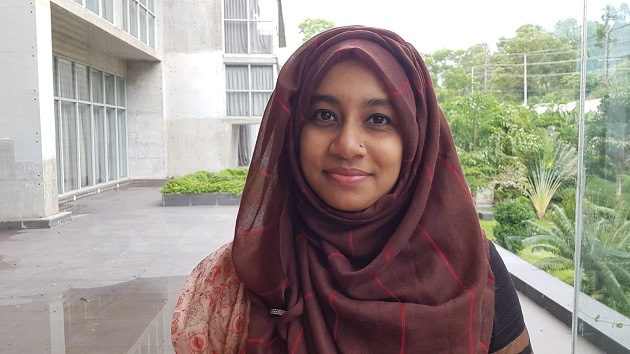The impact of sexual and gender-based violence (SGBV), including rape and intimate partner violence, is devastating for survivors and their communities. In emergencies, where women and children are more vulnerable, this constitutes a significant impediment to the survivor’s participation in recovery and development. In Cox’s Bazar, WHO and UNFPA are partnering to bring together advocates and health care providers to share experiences and learn the guiding principles and their role in GBV prevention and response.
Women and children who have been abused or assaulted need care and support. The health care providers play an important role in the aftermath of sexual assault: they might be the first person the survivor will talk to.
“I responded to a few cases of rape since March this year”, says Rumana Jahan medical officer and a GBV advocate in Kutupalong, Cox’s Bazar. “One little Rohingya girl named Eve*aged 12, came to our health facility with visible scratches on her hands and arms and she was in great distress. Her story inspired me to become a GBV advocate.”
During the four-day training, health care providers learned that after sexual assault they must offer appropriate care in line with Clinical Management guidelines. This includes taking the patient’s history; assessing the survivor’s mental state, physical findings and examination. As for the treatment, it is important to address physical injuries, provide emergency contraception, prevent sexually transmitted infections/HIV and offer psychosocial support. In every step, health professionals need to make consent-based referrals, as requested by the survivor.
“First, I got Eve’s* informed assent to examine her body and she wanted her mother’s presence during consultation and examination. With their consent, I have also referred the case to legal counselling and we will have a follow up appointment next month”, explains the 28-year old medical officer.

“Health providers’ role is to provide confidential and compassionate lifesaving care to survivors of sexual violence, connecting them with other relevant services taking in consideration that this is the beginning of their healing process”, says Anne Oketch, WHO Gender-based violence Technical Officer. “Medical staff can empower, support and deal with women and children transparently and with respect to protect them from further harm and help them regain control of their lives”.
While data on the prevalence of GBV in humanitarian contexts is limited, recent research suggests that approximately one in five refugee or displaced women in complex humanitarian settings have experienced sexual violence. By providing information and counselling, medical staff empower survivors to make informed decisions about their own health.
*Not her real name.
